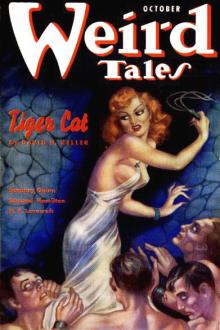Genre Fiction. Page - 253

l, low-storied house, of which the ground-floor was occupied by the proprietor of a dram-shop, who stood smoking in his doorway, next to the entrance-passage. Lupin asked if Mr. Hargrove was at home.
"Mr. Hargrove went out about half-an-hour ago," said the publican. "He seemed very much excited and took a taxi-cab, a thing he doesn't often do."
"And you don't know...."
"Where he was going? Well, there's no secret about it He shouted it loud enough! 'Prefecture of Police' is what he said to the driver...."
Lupin was himself just hailing a taxi, when he changed his mind; and I heard him mutter:
"What's the good? He's got too much start of us...."
He asked if any one called after Mr. Hargrove had gone.
"Yes, an old gentleman with a grey beard and spectacles. He went up to Mr. Hargrove's, rang the bell, and went away again."
"I am much obliged," said Lupin, touching his hat.
He walked away slowly without speaking to me, wearing a thoughtful air. There

s wind to talk sense into you concerning Max. I'm going to Halifax for two months and I want you to take charge of Fatima for me, while I am away."
"Fatima!" I exclaimed.
"Yes. I don't dare to trust her with the servants. Mind you always warm her milk before you give it to her, and don't on any account let her run out of doors."
I looked at Ismay and Ismay looked at me. We knew we were in for it. To refuse would mortally offend Aunt Cynthia. Besides, if I betrayed any unwillingness, Aunt Cynthia would be sure to put it down to grumpiness over what she had said about Max, and rub it in for years. But I ventured to ask, "What if anything happens to her while you are away?"
"It is to prevent that, I'm leaving her with you," said Aunt Cynthia. "You simply must not let anything happen to her. It will do you good to have a little responsibility. And you will have a chance to find out what an adorable creature Fatima really is. Well, that is all settled. I'll send Fatima out to-morrow."

ttwelve paces distant; when, abruptly, the silent figure made three quickstrides to the port rail, and climbed over it into the sea.
I rushed to the side, and stared over; but nothing met my gaze, exceptthe shadow of the ship, sweeping over the moonlit sea.
How long I stared down blankly into the water, it would be impossible tosay; certainly for a good minute. I felt blank--just horribly blank. Itwas such a beastly confirmation of the unnaturalness of the thing Ihad concluded to be only a sort of brain fancy. I seemed, for thatlittle time, deprived, you know, of the power of coherent thought. Isuppose I was dazed--mentally stunned, in a way.
As I have said, a minute or so must have gone, while I had been staringinto the dark of the water under the ship's side. Then, I came suddenlyto my ordinary self. The Second Mate was singing out: "Lee fore brace."
I went to the braces, like a chap in a dream.
II
What Tammy the 'Prentice Saw
The next morning, in my w

blood and fury. Sword still in his hand. No one goes near him. I can hear him panting. A tug on the reins, the horse turns around. The axe is raised. Back at a gallop. Elias spreads his legs, two tree-roots. His head and arms turned to the sky, he drops his sword.
The final blow: 'Omnia sunt communia, sons of whores!'
His head flies into the dust.
* * *
The houses are being ransacked. Doors smashed in with kicks and axe-blows. We'll be next. No time to lose. I lean over him.
'Magister, listen to me, we've got to go, they're coming... For the love of God, Magister...' I grasp his shoulders. He whispers a reply. He can't move. Trapped, we're trapped.
Like Elias.
My hand clutches my sword. Like Elias. I wish I had his courage.
'What do you think you're doing? We've had enough of martyrdom. Go on, get out while you can!'
The voice. As though from the bowels of the earth. I can't believe he's spoken. He's moving even less than be

but I felt real glad. I was afraid he might stay away and sulk. So long as he comes here and sulks I don't worry. But he is feeling badly enough, poor soul, and I'm really eaten up by remorse. He tried to outstay Mr. Sherman last night, but he didn't manage it. You never saw a more depressed-looking creature than he was as he hurried down the lane. Yes, he actually hurried."
The following Sunday evening Arnold Sherman walked to church with Theodora, and sat with her. When they came in Ludovic Speed suddenly stood up in his pew under the gallery. He sat down again at once, but everybody in view had seen him, and that night folks in all the length and breadth of Grafton River discussed the dramatic occurrence with keen enjoyment.
"Yes, he jumped right up as if he was pulled on his feet, while the minister was reading the chapter," said his cousin, Lorella Speed, who had been in church, to her sister, who had not. "His face was as white as a sheet, and his eyes were just glaring out of his head. I

/em>, book. Nouns are proper and common.
Proper nouns are names applied to particular persons or places.
Common nouns are names applied to a whole kind or species.
Nouns are inflected by number, gender and case.
Number is that inflection of the noun by which we indicate whether it represents one or more than one.
Gender is that inflection by which we signify whether the noun is the name of a male, a female, of an inanimate object or something which has no distinction of sex.
Case is that inflection of the noun which denotes the state of the person, place or thing represented, as the subject of an affirmation or question, the owner or possessor of something mentioned, or the object of an action or of a relation.
Thus in the example, "John tore the leaves of Sarah's book," the distinction between book which represents only one object and leaves which repres

hands, which were most elegant and of which he took the greatest care; and throwing on one side the large kid gloves tried on at first, as belonging to the uniform, he put on others of silk only. At this instant the door opened.
"Monsieur d'Artagnan," said the valet-de-chambre.
An officer, as he spoke, entered the apartment. He was a man between thirty-nine and forty years of age, of medium height but a very well proportioned figure; with an intellectual and animated physiognomy; his beard black, and his hair turning gray, as often happens when people have found life either too gay or too sad, more especially when they happen to be of swart complexion.
D'Artagnan advanced a few steps into the apartment.
How perfectly he remembered his former entrance into that very room! Seeing, however, no one there except a musketeer of his own troop, he fixed his eyes upon the supposed soldier, in whose dress, nevertheless, he recognized at the first glance the cardinal.
The lieutenant r

from a sturdy infant had become a sickly, spindling lad. In this year the servant Mehitabel died, and the other servant, Preserved Smith, left without coherent explanation--or at least, with only some wild tales and a complaint that he disliked the smell of the place. For a time Mercy could secure no more help, since the seven deaths and case of madness, all occurring within five years' space, had begun to set in motion the body of fireside rumor which later became so bizarre. Ultimately, however, she obtained new servants from out of town; Ann White, a morose woman from that part of North Kingstown now set off as the township of Exeter, and a capable Boston man named Zenas Low.
* * * * *
It was Ann White who first gave definite shape to the sinister idle talk. Mercy should have known better than to hire anyone from the Nooseneck Hill country, for that remote bit of backwoods was then, as now, a seat of the most uncomfortable superstitions. As lately as 1892 an Exeter community exhumed a dead bo

he youth kissed the hand of his sire who said, "O my son, were I sure that thou wouldest deal justly by Anis al-Jalis, I would give her to thee." "O my father, what justice am I to do to her?" "I enjoin thee, O my son, not to take another wife or concubine to share with her, nor sell her." "O my father! I swear to thee that verily I will not do her injustice in either way." Having sworn to that effect Nur al-Din went in to the damsel and abode with her a whole year, whilst Allah Almighty caused the King to forget the matter of the maiden; and Al-Mu'ín, though the affair came to his ears, dared not divulge it by reason of the high favour in which his rival stood with the Sultan. At the end of the year Al-Fazl went one day to the public baths; and, as he came out whilst he was still sweating, the air struck him[FN20] and he caught a cold which turned to a fever; then he took to his bed. His malady gained ground and restlessness was longsome upon him and weakness bound him like a chain; so he called out,

and report to Commander Walters for your assignments. Tell him I'll be there in a few minutes."
"Yes, sir!" said Tom, and the three cadets saluted sharply.
"Unit--" bawled Strong, "dis--missed!"
Outside in the hall once more, the three cadets wiped their faces.
"Captain Strong definitely was not in a good mood!" commented Roger.
"I've never seen him so angry!" said Tom. "Wonder why."
"Think it might be something to do with our assignments?" asked Astro.
"Never can tell, Astro," said Tom. "And there's only one way to find out. That's to get to Commander Walters' office on the double!"
Without another word the cadets hurried to the slidestairs, each of them hungry for excitement. Already having participated in three outstanding adventures, the cadet members of the Polaris unit were eager to begin a fourth.
[Illustration]
CHAPTER 2
"There's no doubt that the s